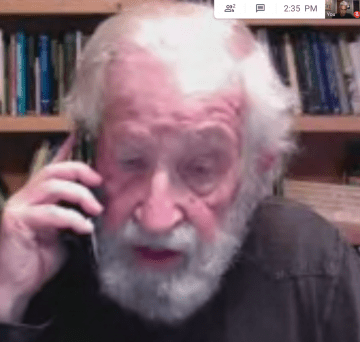James Baldwin in The New York Review of Books:
Dear Sister:

One might have hoped that, by this hour, the very sight of chains on black flesh, or the very sight of chains, would be so intolerable a sight for the American people, and so unbearable a memory, that they would themselves spontaneously rise up and strike off the manacles. But, no, they appear to glory in their chains; now, more than ever, they appear to measure their safety in chains and corpses. And so, Newsweek, civilized defender of the indefensible, attempts to drown you in a sea of crocodile tears (“it remained to be seen what sort of personal liberation she had achieved”) and puts you on its cover, chained.
You look exceedingly alone—as alone, say, as the Jewish housewife in the boxcar headed for Dachau, or as any one of our ancestors, chained together in the name of Jesus, headed for a Christian land.
Well. Since we live in an age in which silence is not only criminal but suicidal, I have been making as much noise as I can, here in Europe, on radio and television—in fact, have just returned from a land, Germany, which was made notorious by a silent majority not so very long ago. I was asked to speak on the case of Miss Angela Davis, and did so. Very probably an exercise in futility, but one must let no opportunity slide.
Iam something like twenty years older than you, of that generation, therefore, of which George Jackson ventures that “there are no healthy brothers—none at all.” I am in no way equipped to dispute this speculation (not, anyway, without descending into what, at the moment, would be irrelevant subtleties) for I know too well what he means. My own state of health is certainly precarious enough. In considering you, and Huey, and George and (especially) Jonathan Jackson, I began to apprehend what you may have had in mind when you spoke of the uses to which we could put the experience of the slave. What has happened, it seems to me, and to put it far too simply, is that a whole new generation of people have assessed and absorbed their history, and, in that tremendous action, have freed themselves of it and will never be victims again. This may seem an odd, indefensibly impertinent and insensitive thing to say to a sister in prison, battling for her life—for all our lives. Yet, I dare to say, for I think that you will perhaps not misunderstand me, and I do not say it, after all, from the position of a spectator.
I am trying to suggest that you—for example—do not appear to be your father’s daughter in the same way that I am my father’s son.
More here.

 Here’s something I thought I’d never say: Donald Trump was correct. Back in 1997, anyway. About shaking hands. “The Japanese have it right,” the allegedly germaphobic Trump wrote (with co-author Kate Bohner) in the book Trump: The Art of the Comeback. “They stand slightly apart and do a quick, formal and very beautiful bow in order to acknowledge each other’s presence … I wish we would develop a similar greeting custom in America. In fact, I’ve often thought of taking out a series of newspaper ads encouraging the abolishment of the handshake.” Of course, because of COVID-19, the handshake is out. Unfortunately, it could make its own comeback without vigorous lobbying against it. I will now do some of that lobbying. “Recent medical reports,” Trump also wrote, “have come out saying that colds and various other ailments are spread through the act of shaking hands. I have no doubt about this.” Indeed, a search using the terms “handshake” and “infection” in journal articles between 1990 and 1997 turns up a 1991 write-up in the Journal of Clinical Microbiology with the title “Potential Role of Hands in the Spread of Respiratory Viral Infections: Studies with Human Parainfluenza Virus 3 and Rhinovirus 14.”
Here’s something I thought I’d never say: Donald Trump was correct. Back in 1997, anyway. About shaking hands. “The Japanese have it right,” the allegedly germaphobic Trump wrote (with co-author Kate Bohner) in the book Trump: The Art of the Comeback. “They stand slightly apart and do a quick, formal and very beautiful bow in order to acknowledge each other’s presence … I wish we would develop a similar greeting custom in America. In fact, I’ve often thought of taking out a series of newspaper ads encouraging the abolishment of the handshake.” Of course, because of COVID-19, the handshake is out. Unfortunately, it could make its own comeback without vigorous lobbying against it. I will now do some of that lobbying. “Recent medical reports,” Trump also wrote, “have come out saying that colds and various other ailments are spread through the act of shaking hands. I have no doubt about this.” Indeed, a search using the terms “handshake” and “infection” in journal articles between 1990 and 1997 turns up a 1991 write-up in the Journal of Clinical Microbiology with the title “Potential Role of Hands in the Spread of Respiratory Viral Infections: Studies with Human Parainfluenza Virus 3 and Rhinovirus 14.” A woman stands in an otherworldly landscape, looking out. The landscape is sublime, though not the European sublime of cliffs, peaks, and mist. Here the sublime is
A woman stands in an otherworldly landscape, looking out. The landscape is sublime, though not the European sublime of cliffs, peaks, and mist. Here the sublime is  It’s apt then that much of the novel’s power lies in its mystery. The narrator—if, indeed, we’re listening to the same single voice throughout—seems to be a writer, who lives in a book-filled ex-coastguard’s cottage, alone apart from their dog. They are never named. Nor is his or her gender revealed, something that’s in line with what Kris Kirk, in an interview with Dick in the Guardian in 1984 described as Dick’s “androgynous mental attitude.” Dick had just finished explaining why the “overall tone” of the personal relationships depicted in her books is always bisexual, which is how she herself identified. She also notes that although she’s sexually attracted to both men and women, there’s “something extra” in her relationships with the latter; “this love, this emotion,” she clarifies. “I have certain prejudices and one of them is that I cannot bear apartheid of any kind—class, colour or sex,” she tells Kirk. “Gender is of no bloody account and if anything drives me round the bend it’s these separatist feminist lessies.” Given that Dick made a habit of loosely fictionalizing her own experiences, I’ve come to think of her protagonist in They as female. Even more inscrutable though are the “they” of the book’s title; “omnipresent and elusive,” as Howard describes them, extremely dangerous and violent, but also strangely vacant and automaton-like. “They” are rarely distinguished as individuals, which situates them in stark contrast to the narrator and her acquaintances.
It’s apt then that much of the novel’s power lies in its mystery. The narrator—if, indeed, we’re listening to the same single voice throughout—seems to be a writer, who lives in a book-filled ex-coastguard’s cottage, alone apart from their dog. They are never named. Nor is his or her gender revealed, something that’s in line with what Kris Kirk, in an interview with Dick in the Guardian in 1984 described as Dick’s “androgynous mental attitude.” Dick had just finished explaining why the “overall tone” of the personal relationships depicted in her books is always bisexual, which is how she herself identified. She also notes that although she’s sexually attracted to both men and women, there’s “something extra” in her relationships with the latter; “this love, this emotion,” she clarifies. “I have certain prejudices and one of them is that I cannot bear apartheid of any kind—class, colour or sex,” she tells Kirk. “Gender is of no bloody account and if anything drives me round the bend it’s these separatist feminist lessies.” Given that Dick made a habit of loosely fictionalizing her own experiences, I’ve come to think of her protagonist in They as female. Even more inscrutable though are the “they” of the book’s title; “omnipresent and elusive,” as Howard describes them, extremely dangerous and violent, but also strangely vacant and automaton-like. “They” are rarely distinguished as individuals, which situates them in stark contrast to the narrator and her acquaintances. If we’d lost the war, we’d all have been prosecuted as war criminals.” So said
If we’d lost the war, we’d all have been prosecuted as war criminals.” So said  The past decade has seen a raft of efforts to encourage robust, credible research. Some focus on changing incentives, for example by modifying promotion and publication criteria to favour open science over sensational breakthroughs. But attention also needs to be paid to individuals. All-too-human cognitive biases can lead us to see results that aren’t there. Faulty reasoning results in shoddy science, even when the intentions are good.
The past decade has seen a raft of efforts to encourage robust, credible research. Some focus on changing incentives, for example by modifying promotion and publication criteria to favour open science over sensational breakthroughs. But attention also needs to be paid to individuals. All-too-human cognitive biases can lead us to see results that aren’t there. Faulty reasoning results in shoddy science, even when the intentions are good. NOAM: For me it’s been extremely busy. I’m isolated, don’t go out, and don’t have any visitors. Constantly occupied with interviews, requests way beyond what I can accept. Busier than I can ever remember.
NOAM: For me it’s been extremely busy. I’m isolated, don’t go out, and don’t have any visitors. Constantly occupied with interviews, requests way beyond what I can accept. Busier than I can ever remember. But the Magdalena has also been a place of unimaginable violence, death and environmental destruction. Colombia’s modern history, recounted here in episodic vignettes, appears to be one drawn-out conflict, from the bloodletting of the conquistadors, to the War of Independence and the multiple civil wars that followed, to a post-Second World War era known as La Violencia, which pitted liberals against conservatives in a brutal struggle for power.
But the Magdalena has also been a place of unimaginable violence, death and environmental destruction. Colombia’s modern history, recounted here in episodic vignettes, appears to be one drawn-out conflict, from the bloodletting of the conquistadors, to the War of Independence and the multiple civil wars that followed, to a post-Second World War era known as La Violencia, which pitted liberals against conservatives in a brutal struggle for power. The clichés of romantic ballads can be a comforting reprieve from the coldness of the world. Pop ballads are fugue states of feeling, offering reams of experience in three minutes or less. Leon Russell’s “A Song for You,” is the ultimate alternate-universe lament, as if Russell translated the multiverse theory from the jargon of physics into lyrics. Semi-unofficially, Wikipedia says “A Song For You” has been covered over 217 times, on studio albums, live recordings, tours, and American Idol stages. It’s been recorded by musicians as diverse as Donny Hathaway, Aretha Franklin, Beyoncé, Bizzy Bone, Amy Winehouse, Justin Vernon of Bon Iver, and Indiana Pacers star Victor Oladipo. Seriously unofficially, the song has been covered thousands more times, interpolated, sampled, and strummed at cafés, quoted in marriage vows, hummed at memorials, two-stepped to at ‘70s spring dances, and poignantly blared in two-person car concerts. Like every great ballad, the song’s lyrics lend themselves to an easy expression of intimacy. “A Song for You” is as blank-slate heart-rending as any song that’s been dedicated to a lover on a radio station’s dedication hour, when the lyrics are cherry-picked to pluck at heart-strings.
The clichés of romantic ballads can be a comforting reprieve from the coldness of the world. Pop ballads are fugue states of feeling, offering reams of experience in three minutes or less. Leon Russell’s “A Song for You,” is the ultimate alternate-universe lament, as if Russell translated the multiverse theory from the jargon of physics into lyrics. Semi-unofficially, Wikipedia says “A Song For You” has been covered over 217 times, on studio albums, live recordings, tours, and American Idol stages. It’s been recorded by musicians as diverse as Donny Hathaway, Aretha Franklin, Beyoncé, Bizzy Bone, Amy Winehouse, Justin Vernon of Bon Iver, and Indiana Pacers star Victor Oladipo. Seriously unofficially, the song has been covered thousands more times, interpolated, sampled, and strummed at cafés, quoted in marriage vows, hummed at memorials, two-stepped to at ‘70s spring dances, and poignantly blared in two-person car concerts. Like every great ballad, the song’s lyrics lend themselves to an easy expression of intimacy. “A Song for You” is as blank-slate heart-rending as any song that’s been dedicated to a lover on a radio station’s dedication hour, when the lyrics are cherry-picked to pluck at heart-strings. Yale physicists have developed an error-correcting cat—a new device that combines the Schrödinger’s cat concept of superposition (a physical system existing in two states at once) with the ability to fix some of the trickiest errors in a quantum computation. It is Yale’s latest breakthrough in the effort to master and manipulate the physics necessary for a useful quantum computer: Correcting the stream of errors that crop up among fragile bits of quantum
Yale physicists have developed an error-correcting cat—a new device that combines the Schrödinger’s cat concept of superposition (a physical system existing in two states at once) with the ability to fix some of the trickiest errors in a quantum computation. It is Yale’s latest breakthrough in the effort to master and manipulate the physics necessary for a useful quantum computer: Correcting the stream of errors that crop up among fragile bits of quantum  The far left of the Democratic Party spent much of the primary attacking Kamala Harris, decrying her as an
The far left of the Democratic Party spent much of the primary attacking Kamala Harris, decrying her as an  His work was substantial, his opinions horrendous, his reputation a battleground. It was February 1949 and the Fellows in American Letters of the Library of Congress had decided to award the inaugural Bollingen Prize for Poetry to Ezra Pound for The Pisan Cantos. Pound, a giant of modernism, had begun the poems in a US Army detention camp and finished them in a psychiatric hospital under indictment for treason, having spent much of the war broadcasting anti-Semitic, fascist propaganda for Mussolini. The judging panel, which included W. H. Auden, Robert Lowell and Pound’s friend T. S. Eliot, justified its decision on purely aesthetic grounds, because to take into account Pound’s politics
His work was substantial, his opinions horrendous, his reputation a battleground. It was February 1949 and the Fellows in American Letters of the Library of Congress had decided to award the inaugural Bollingen Prize for Poetry to Ezra Pound for The Pisan Cantos. Pound, a giant of modernism, had begun the poems in a US Army detention camp and finished them in a psychiatric hospital under indictment for treason, having spent much of the war broadcasting anti-Semitic, fascist propaganda for Mussolini. The judging panel, which included W. H. Auden, Robert Lowell and Pound’s friend T. S. Eliot, justified its decision on purely aesthetic grounds, because to take into account Pound’s politics  It all began with a simple question.
It all began with a simple question. Six to eight weeks. That’s how long some of the nation’s leading public health experts say it would take to finally get the United States’ coronavirus epidemic under control. If the country were to take the right steps, many thousands of people could be spared from the ravages of Covid-19. The economy could finally begin to repair itself, and Americans could start to enjoy something more like normal life.
Six to eight weeks. That’s how long some of the nation’s leading public health experts say it would take to finally get the United States’ coronavirus epidemic under control. If the country were to take the right steps, many thousands of people could be spared from the ravages of Covid-19. The economy could finally begin to repair itself, and Americans could start to enjoy something more like normal life.